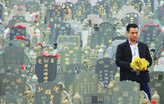Asia
Japan stops leaks from nuclear plant
Updated: 2011-04-06 09:41
(Agencies)
TOKYO - Engineers have stopped highly radioactive water leaking into the sea from a crippled Japanese nuclear power plant, the facility's operator said on Wednesday, a breakthrough in the battle to contain the worst nuclear crisis since Chernobyl.
However, Tokyo Electric Power (TEPCO) still needs to pump low-level contaminated water into the sea because of a lack of storage space at the facility.
"The leaks were slowed yesterday after we injected a mixture of liquid glass and a hardening agent and it has now stopped," a TEPCO spokesman told Reuters.
Engineers had been desperately struggling to stop the leaks and had used sawdust, newspapers and concrete as well as liquid glass to try to stem the flow of the highly-contaminated water.
The liquid glass was injected into the ground beneath the leaking storage pit on Tuesday and stopped the leak after solidifying the earth.
Engineers are still faced with the massive problem of how to store 60,000 tonnes (60 million litres) of contaminated seawater used to cool over-heated fuel rods and are being forced to pump 11,500 tonnes of low-level radioactive water back into the sea.
"The situation is not under control yet," said Thomas Grieder, Asia analyst at forecasting firm IHS Global Insight.
"TEPCO's decision to displace the contaminated water into the ocean reflected the urgency of clearingç垚he turbine buildings and trenches of radioactive water so as not to damage equipment needed for restoration of cooling systems."
Workers are struggling to restart cooling pumps -- which recycle the water -- in four reactors damaged by the March 11 earthquake and tsunami that hit northeast Japan.
Until those are fixed, they must pump in water from outside to prevent overheating and meltdowns.
RADIATION FEARS
Japan is facing its worst crisis since World War Two after a 9.0 magnitude earthquake and tsunami hit its northeast coast, leaving nearly 28,000 people dead or missing, thousands homeless, and rocking the world's third-largest economy.
The world's costliest natural disaster has hit Japan's economy and left a damages bill which may top $300 billion, forcing the Japanese government to plan an extra budget to pay for the massive recovery.
Radiation fears have seen several countries ban Japanese food imports from the nuclear zone, while India is the first to ban food imports from all areas of Japan over radiation fears.
Japan has called for calm over radiation concerns, but is itself considering imposing radioactivity restrictions on seafood for the first time after contaminated fish were found.
Samples of the water used to cool reactor No 2 were 5 million times the legal limit of radioactivity, officials said on Tuesday, adding to fears that contaminants had spread far beyond the disaster zone.
Small levels of radiation have been detected as far away as Europe and the west coast of the United States.
Radioactive iodine of up to 4,800 times the legal limit has been recorded in the sea near the plant. Caesium was found at levels above safety limits in tiny kounago fish in waters off Ibaraki Prefecture, south of Fukushima, local media reported.
Iodine-131 in the water near the sluice gate of reactor No 2 hit a high on April 2 of 7.5 million times the legal limit. The water, which was not released into the ocean, fell to 5 million times the legal limit on Monday.
CONDOLENCE MONEY
TEPCO has started paying "condolence money" to those affected in the Fukushima region where the plant is based. But one city rejected the money and local mayors who came to Tokyo to meet Prime Minister Naoto Kan demanded far more help.
"We have borne the risks, co-existed and flourished with TEPCO for more than 40 years, and all these years, we have fully trusted the myth that nuclear plants are absolutely safe," said Katsuya Endo, the mayor of Tomioka town.
He was one of eight Fukushima prefecture mayors who went to Kan to demand compensation and support for employment, housing and education for the tens of thousands of crisis evacuees.
TEPCO shares continued to tumble on Wednesday, already having hit a 60-year low on Tuesday.
($1 = 84.040 Japanese Yen)
Specials

Fill dad's shoes
Daughter and son are beginning to take over the family business of making shoes.

Have you any wool?
The new stars of Chinese animation are edging out old childhood icons like Mickey Mouse and Hello Kitty.

Virtual memorial
High-Tech touches to traditional tombsweeping festival help environment